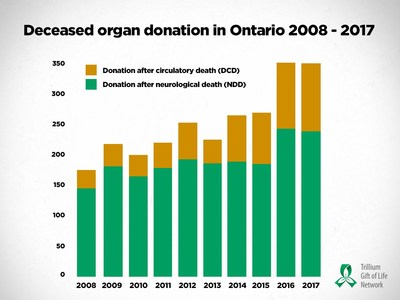TORONTO, Jan. 24, 2018 /CNW/ - Since 2008, the number of deceased organ donors in Ontario has nearly doubled, increasing by 98 per cent.
Trillium Gift of Life Network (TGLN), Ontario's government agency responsible for organ and tissue donation and transplantation, released its 2017 results today and reviews its progress over the past 10 years (January 1, 2008 – December 31, 2017).
TGLN has applied a number of leading practices that have contributed to its success over the last decade, including: implementing routine notification at 69 hospital corporations, which requires hospitals to refer all potential donation cases to TGLN, and appointing 58 donation physicians that work alongside the hospitals' executive and operational staff and TGLN to ensure donation is part of quality end-of-life care.
Ontario is a leader in donation
In 2017, there were 347 deceased organ donors compared to 175 in 2008.
TGLN's leading practices have included the application of donation after circulatory death (DCD), which, in conjunction with other advanced efforts, has been a significant contributor to the growth of deceased organ donors in Ontario.
There are two types of donation after death: donation after neurological death (NDD) and donation after circulatory death (DCD). DCD is an option when a patient has a severe neurological injury, with no chance for recovery, and the decision to withdraw life-sustaining treatment has been made. The first DCD case in modern Canadian history was performed in Ontario in 2006. In the last 10 years, DCD has increased by 260 per cent and today, approximately 1 in 3 organ donors are a result of DCD.
Similarly, as a result of the expansion of routine notification from 21 hospitals in 2011 to 69 hospital corporations today, the number of tissue donors has climbed considerably, growing 102 per cent from 1,061 in 2008 to 2,141 in 2017.
One tissue donor can enhance the lives of up to 75 people: eyes can restore sight; skin can help burn patients; bone can be used for joint replacements; heart valves can help patients with congenital heart disease; and tendons and ligaments can help people walk and run.
Transplant performance results give people hope
Largely due to the rise in deceased donation, the number of organ transplants in Ontario has increased by 46 per cent in the last 10 years (1,268 in 2017 compared to 867 in 2008). However, despite the increase in both donation and transplant, the need for transplant continues to outweigh the number of organs available for transplant.
"We all, as Ontarians, deserve to feel great pride in the advancements in our province's donation and transplant system," said Ronnie Gavsie, President and CEO, Trillium Gift of Life Network. "More and more medical conditions are being treated by organ transplant; more and more lives are being saved; we have an internationally renowned system. But as long as there are people waiting for a lifesaving organ transplant, there is much more to be done. Together, with our committed hospital partners, we are continuously working to make improvements to ensure that there are no missed opportunities for donation."
A culture of donation in Ontario
In 2008, only 16 per cent of eligible Ontarians were registered. Today, 32 per cent (nearly four million Ontarians) have registered their consent to organ and tissue donation. Over the last ten years, the number of registered organ and tissue donors have grown by 126 per cent.
"Ontario's success in organ donation and transplant is only possible because of the incredible donors and their families who make the generous and difficult decision to give the gift of life," said Dr. Eric Hoskins, Ontario's Minister of Health and Long Term Care. "Because of their gift, over 1,200 people were given a second chance at life in 2017. Register today at www.BeADonor.ca and give hope to the 1,500 people waiting."
Trillium Gift of Life Network is a not-for-profit agency of the Government of Ontario responsible for planning, promoting, coordinating and supporting organ and tissue donation for transplantation across Ontario and improving the system so that more lives can be saved.
SOURCE Trillium Gift of Life Network

Jennifer Long, Communications Advisor, 416-619-2327, [email protected]


Share this article